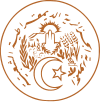
A prime minister or chief of cabinet is the head of the cabinet and the leader of the ministers in the executive branch of government, often in a parliamentary or semi-presidential system. A prime minister is not the head of state, but rather the head of government, serving as the chief of the executive under either a monarch or a president in a republican form of government.

The president of France, officially the president of the French Republic, is the executive head of state of France, and the commander-in-chief of the French Armed Forces. As the presidency is the supreme magistracy of the country, the position is the highest office in France. The powers, functions and duties of prior presidential offices, in addition to their relation with the prime minister and government of France, have over time differed with the various constitutional documents since the Second Republic.

Politics of Algeria takes place in a framework of a constitutional semi-presidential republic, whereby the President of Algeria is head of state while the Prime Minister of Algeria is the head of government. Executive power is exercised by the government. Legislative power is vested in both the government and the two chambers of parliament, the People's National Assembly and the Council of the Nation.

The president of the Republic of Korea, also known as the president of Korea, is both the head of state and head of government of the Republic of Korea. The president is elected by citizens of the Republic of Korea and pledges to execute the duties of their office, chief among others "to defend the State, pursue peaceful unification of the homeland." The president leads the State Council, is the chief of the executive branch of the national government and the commander-in-chief of the Republic of Korea Armed Forces.
A motion or vote of no confidence is a motion and corresponding vote thereon in a deliberative assembly as to whether an officer is deemed fit to continue to occupy their office. The no-confidence vote is a defining constitutional element of a parliamentary system, in which the executive's mandate rests upon the continued support of the majority in the legislature. Systems differ in whether such a motion may be directed against the prime minister, against individual cabinet ministers, against the cabinet as a whole, or some combination of the above.

The Fifth Republic is France's current republican system of government. It was established on 4 October 1958 by Charles de Gaulle under the Constitution of the Fifth Republic.
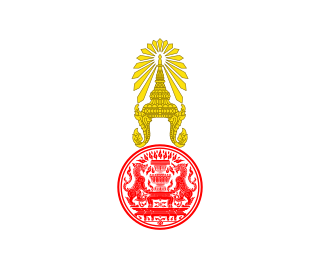
The prime minister of Thailand, officially titled the prime minister of the Kingdom of Thailand, is the head of government of the Kingdom of Thailand. The prime minister is also the chair of the Cabinet of Thailand. The post has existed since the Revolution of 1932, when the country became a constitutional monarchy. Prior to the 2014 coup d'état, the prime minister was nominated by a vote in the Thai House of Representatives by a simple majority, and is then appointed and sworn in by the king of Thailand. The house's selection is usually based on the fact that either the prime minister is the leader of the largest political party in the lower house or the leader of the largest coalition of parties. In accordance with the 2017 Constitution, the Prime Minister can hold the office for no longer than eight years, consecutively or not. The current prime minister is Paetongtarn Shinawatra, who took office on 16th August 2024 after the removal of Srettha Thavisin.
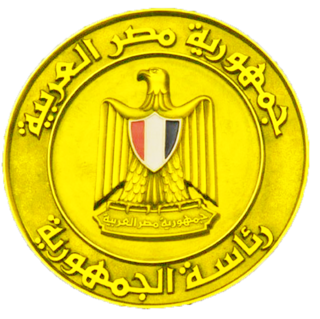
The President of the Republic of Egypt is the executive head of state of Egypt and the de facto appointer of the official head of government under the Egyptian Constitution of 2014. Under the various iterations of the Constitution of Egypt following the Egyptian Revolution of 1952, the president is also the supreme commander of the Armed Forces, and head of the executive branch of the Egyptian government.

The current Constitution of France was adopted on 4 October 1958. It is typically called the Constitution of the Fifth Republic(French: la Constitution de la Cinquième République), and it replaced the Constitution of the Fourth Republic of 1946 with the exception of the preamble per a 1971 decision of the Constitutional Council. The current Constitution regards the separation of church and state, democracy, social welfare, and indivisibility as core principles of the French state.

The president of the People's Democratic Republic of Algeria is the head of state and chief executive of Algeria, as well as the commander-in-chief of the Algerian People's National Armed Forces.
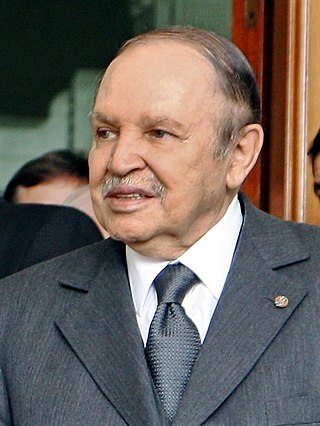
Abdelaziz Bouteflika was an Algerian politician and diplomat who served as the seventh president of Algeria from 1999 to his resignation in 2019.

The president of Pakistan is the head of state of the Islamic Republic of Pakistan. The president is the nominal head of the executive and the supreme commander of the Pakistan Armed Forces. The presidency is a ceremonial position in Pakistan. The president is bound to act on advice of the prime minister and cabinet. Asif Ali Zardari is the current president since 10 March 2024.

The Prime Ministerof Vietnam, is the head of government of Vietnam who presides over the meetings of the Government. The prime minister directs the work of government members, and may propose deputy prime ministers to the National Assembly.
Mohammed ben Ahmed Abdelghani was the prime minister of Algeria under President Chadli Bendjedid from 8 March 1979 until 22 January 1984. Previously the position had been disestablished in 1963. He was an officer of the Algerian Army and commanded the 1st Military Region from 1962 to 1964. As of 2017, he has served the longest consecutive term of any prime minister in Algeria.

An Algerian Constitution was first adopted by a referendum in 1963, following the Algerian War of Independence (1954–62); originally, it was to be drafted by a constitutional assembly led by Ferhat Abbas, but this body was sidelined by Algeria's first President, Ahmed Ben Bella. In its 1963 form, the constitution declared Algeria a one-party state ruled by the former resistance movement, the National Liberation Front (FLN). This constitution was suspended by the military coup d'état of 1965. After years of ruling by executive fiat as leader of the Revolutionary Council, Houari Boumédienne issued a second constitution in 1976, emphasizing the importance of socialism and - formally - restoring political institutions to their primacy over the military establishment.

The People's National Assembly is the lower house of the Algerian Parliament. It is composed of 407 members directly elected by the population. Of the 407 seats, 8 are reserved for Algerians living abroad. Members of the People's National Assembly are directly elected through proportional representation in multiple-member districts and serve terms lasting five years at a time. The last election for this body was held on 12 June 2021. The minimum age for election to the Assembly is 28.

The prime minister of Cambodia is the head of government of Cambodia. The prime minister is also the chairman of the Cabinet and leads the executive branch of the Royal Government of Cambodia. The prime minister is a member of parliament, and is appointed by the monarch for a term of five years. Since 1945, 37 individuals have served as prime minister; 33 as official prime ministers, and 4 in acting capacities. The current prime minister since 2023 is Hun Manet.
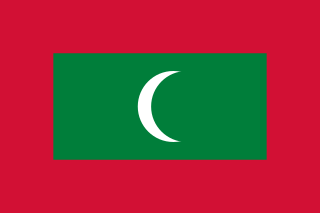
The vice president of the Republic of Maldives is the second-highest official in the executive branch of the government of the Maldives, after the president of the Maldives, and ranks first in the presidential line of succession. The vice president is directly elected together with the president to a five-year term of office.

Abdelmadjid Tebboune is an Algerian politician currently serving as the President of Algeria since December 2019 and as Minister of Defence.

A constitutional referendum was held in Algeria on 1 November 2020. The subject of the referendum was a revision of the Algerian constitution, and it follows a series of protests known as Hirak.
